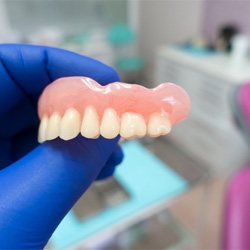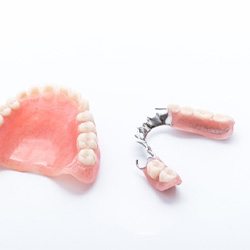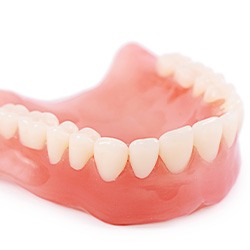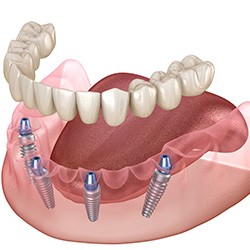
Dentures – Sagamore Hills, OH
Restoring Your Smile After Extensive Tooth Loss
 People who want an affordable, straightforward
restorative option
to replace all of their missing teeth often turn to dentures. Rest assured that your own prosthesis will be made out of high-quality materials and will be customized for your unique mouth. We’ll also make sure that your new teeth are as lifelike as possible so that you can show off your new smile without any reservations.
Reach out today
if you’re interested in asking Dr. Greenwood for a personalized denture.
People who want an affordable, straightforward
restorative option
to replace all of their missing teeth often turn to dentures. Rest assured that your own prosthesis will be made out of high-quality materials and will be customized for your unique mouth. We’ll also make sure that your new teeth are as lifelike as possible so that you can show off your new smile without any reservations.
Reach out today
if you’re interested in asking Dr. Greenwood for a personalized denture.
Why Choose Greenwood Dental for Dentures?
- In-Office Dental Implant Placement
- Practice Known for Reasonable Fees
- Trustworthy, Honest Dentist
Who is a Good Candidate for Dentures?

As you can probably guess, the first step to getting dentures is to pay your dentist a visit and figure out whether they’re really the solution you need. We’ll discuss all of the options that can re-complete your smile and help you narrow down which one you should pursue. When it comes to dentures, the best candidates are normally those who have already experienced extensive tooth loss and currently have healthy gums as well as a strong jawbone.
Types of Dentures

What kind of denture are you thinking of getting? Do you simply have a few missing teeth that a partial denture could replace? Do you need a full denture to restore your upper or lower arch? Or were you thinking you could get dentures supported by dental implants? It’s important to know the differences between the different types of dentures so that you can narrow down the kind that’s right for you.
Partial Dentures
Partial dentures come with clasps to keep them attached to their mouth. We can personalize your partial denture based on the specific teeth you’ve lost in order to fill in multiple gaps at once.
Full Dentures
Full dentures normally use natural suction to stay in place on the gums, although denture adhesive can sometimes be used to give them a bit more stability. A full denture is often necessary when an entire row of teeth has been lost.
Implant Dentures
At least four dental implants are typically needed to support a full denture. There are several advantages to getting implant dentures, such as not having to worry about unwanted movement. Also, if you get a fixed implant denture, you can brush it the same way you would your real teeth.
The Benefits of Dentures

Once you get your new dentures, you’ll notice several positive changes in your life. You’ll have an easier time chewing again, and you’ll likely feel more confident about your appearance overall. And when it comes to longevity, you can often expect dentures to last around a decade.
Understanding the Cost of Dentures

There are a number of things we’ll need to discuss before you can get dentures, not the least of which is the cost of your new prosthesis. Not all patients will pay exactly the same amount for dentures due to a number of factors. Luckily, you won’t have to make an uninformed decision because our team can give you a personalized estimate of what you will likely end up paying. We can also help you take advantage of your dental insurance to fit dentures into your budget more easily.
Factors That Affect the Cost of Dentures

There are several questions that our team needs to answer to figure out the cost of your dentures:
- Are preparatory treatments needed? Procedures such as tooth extractions or gum disease treatment could be necessary to get the mouth ready for dentures, and they carry costs of their own.
- How many teeth need to be replaced? The answer to this question can determine whether you need to pay for a partial denture or a full denture.
- What will your dentures be made out of? Higher-quality materials tend to be more costly, but they also often last longer and offer better comfort.
We can go over these factors during your initial consultation in order to make sure that you fully understand what’s influencing the cost of your dentures. Remember, when it comes to dentures, the cheapest option is not always the ideal one; the quality of your prosthesis will often be reflected in what you paid for it.
Are Implant Dentures More Expensive?

Dental implants cost more upfront than traditional forms of tooth replacement. As such, you can certainly expect implant dentures to generally cost more than traditional ones. However, many patients find that implant dentures are worth the cost in the long run. They offer many benefits, such as not slipping at awkward moments and providing stimulation to the jawbone. On top of that, implant dentures can often last far longer than traditional ones, meaning you won’t have to worry about replacing them as frequently.
Does Dental Insurance Cover Dentures?

Dentures are often covered by dental insurance, but the exact details of said coverage depend on which plan you have. Many companies are willing to pay around 50% of the cost of dentures, but the amount you need to pay yourself could be affected by your annual maximum or your deductible.
We are in-network with many dental insurance providers, and we can file any claims on your behalf. If there’s anything you don’t understand about your coverage, our team can review your plan with you and answer your questions.
It’s normal to be nervous about the cost of dentures, but it will be worth it once you’re able to enjoy the benefits of a complete smile again. Reach out to us today if you have any questions about the financial aspect of getting dentures.
Denture FAQs
What Should You Do If Your Dentures Break?
A well-made denture can typically last for many years if you take good care of it, but you still need to be prepared to take action if it ever breaks. The best thing you can do is call your dentist right away and let them know what happened; they can take a closer look at your prosthesis to see how bad the damage is.
Sometimes you may be able to simply have your dentures repaired. This can often be done in the dentist’s office, but in some cases it may be necessary to send the prosthesis to a dental lab. In cases where a denture is broken in half or is otherwise badly damaged, replacing it may be the only option remaining.
Can Dentures Become Ill-Fitting?
When you first receive your dentures, they should have a very comfortable fit because they will be designed for your unique mouth. However, over time the bone in your jaw will start to degenerate. This can change the shape of your gums, and as a result your dentures may not fit as well as they used to after several years.
Wearing an ill-fitting denture can cause more problems than you might expect. They can irritate your gums, leading to soreness and swelling. On top of that, you may have trouble speaking clearly.
If you have concerns about the fit of your denture, talk to your dentist. It may be possible to have the prosthesis relined so that it fits properly again, although your dentist may sometimes suggest replacing it altogether.
Can I Sleep with My Dentures?
For the first 24 hours after you get your dentures, you’ll need to keep them in your mouth at all times, which includes when you’re asleep. After that point, you should get in the habit of always taking your dentures out before bedtime.
Removing your dentures periodically is necessary to give your mouth a break. The pressure from the prosthesis restricts circulation in the gums; as such, constantly wearing it will irritate your soft tissues, and it could even speed up the bone loss process in the jaw. But if you take your dentures out at night, your gums will be able to recover from the pressure they were exposed to during the day.
Can You Still Eat Steak with Dentures?
Denture-wearers typically have a harder time eating tough meats or any other foods that requires a lot of chewing. That said, it is still possible to enjoy steak if you prepare it properly first. Choose a cut that doesn’t contain too many connective tissues and muscle fibers; tenderloin is often a good option. Then tenderize the meat thoroughly before cooking it. When the time comes to eat the steak, cut it into very small pieces that are easier for you to chew.